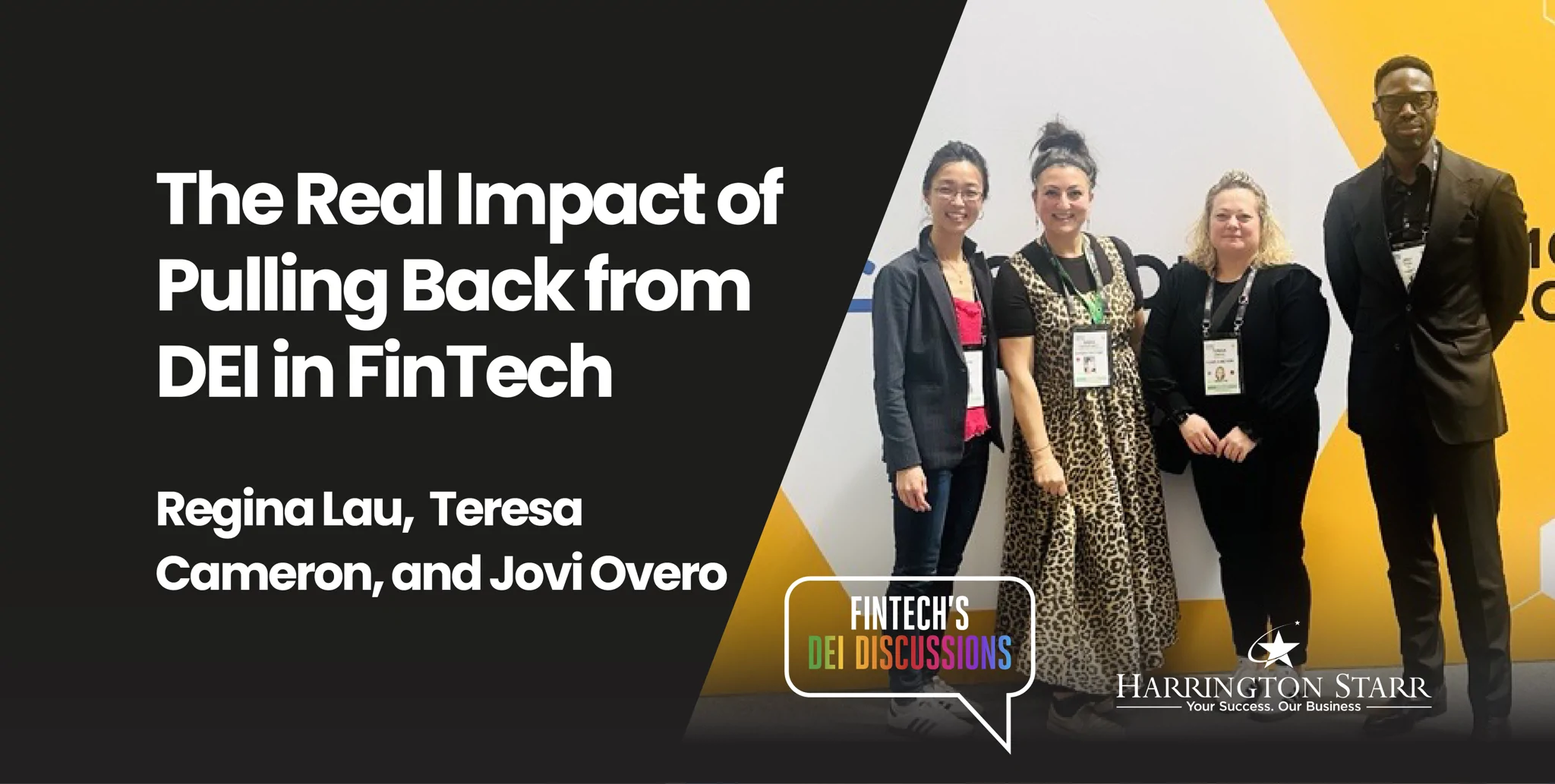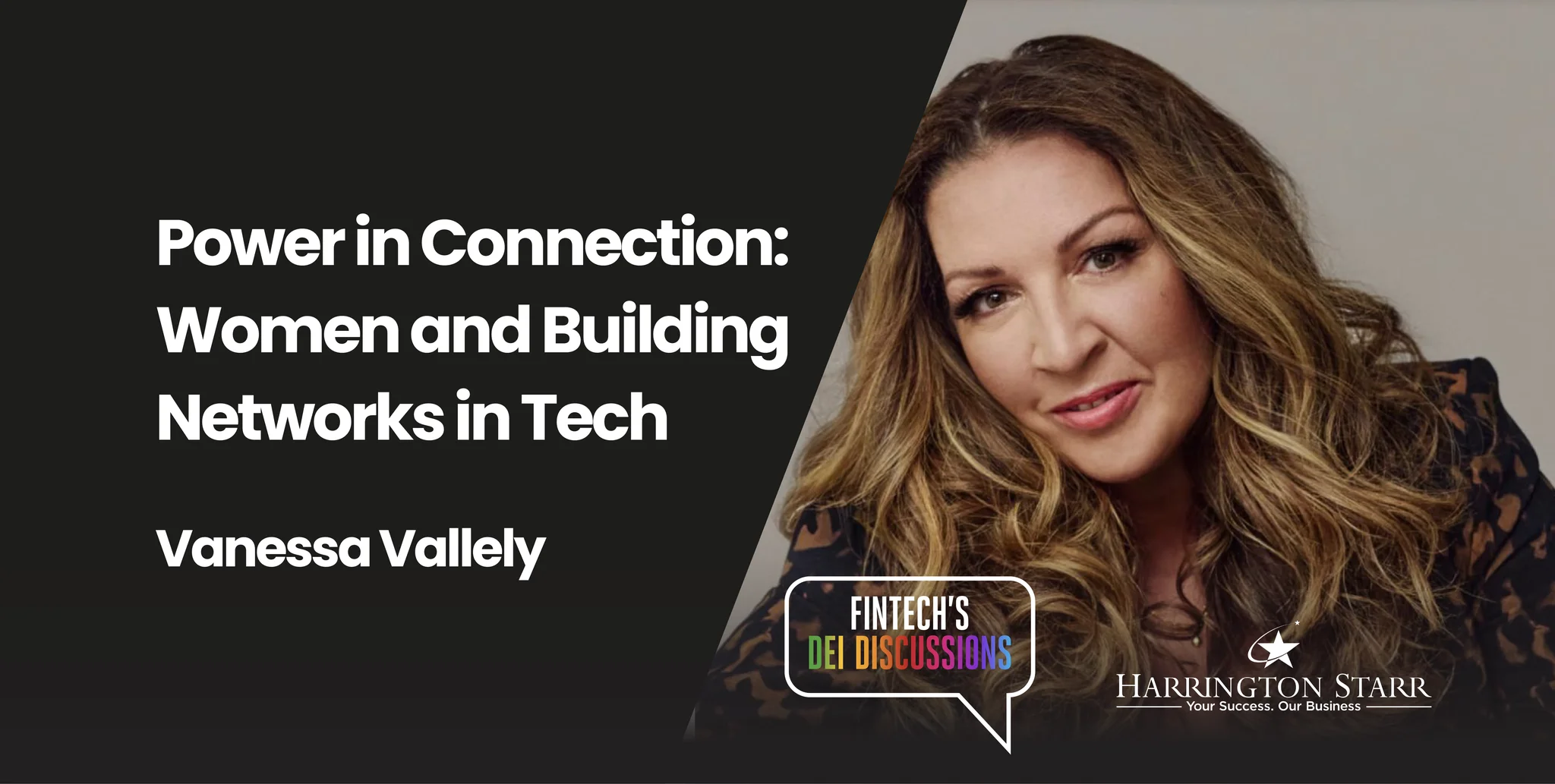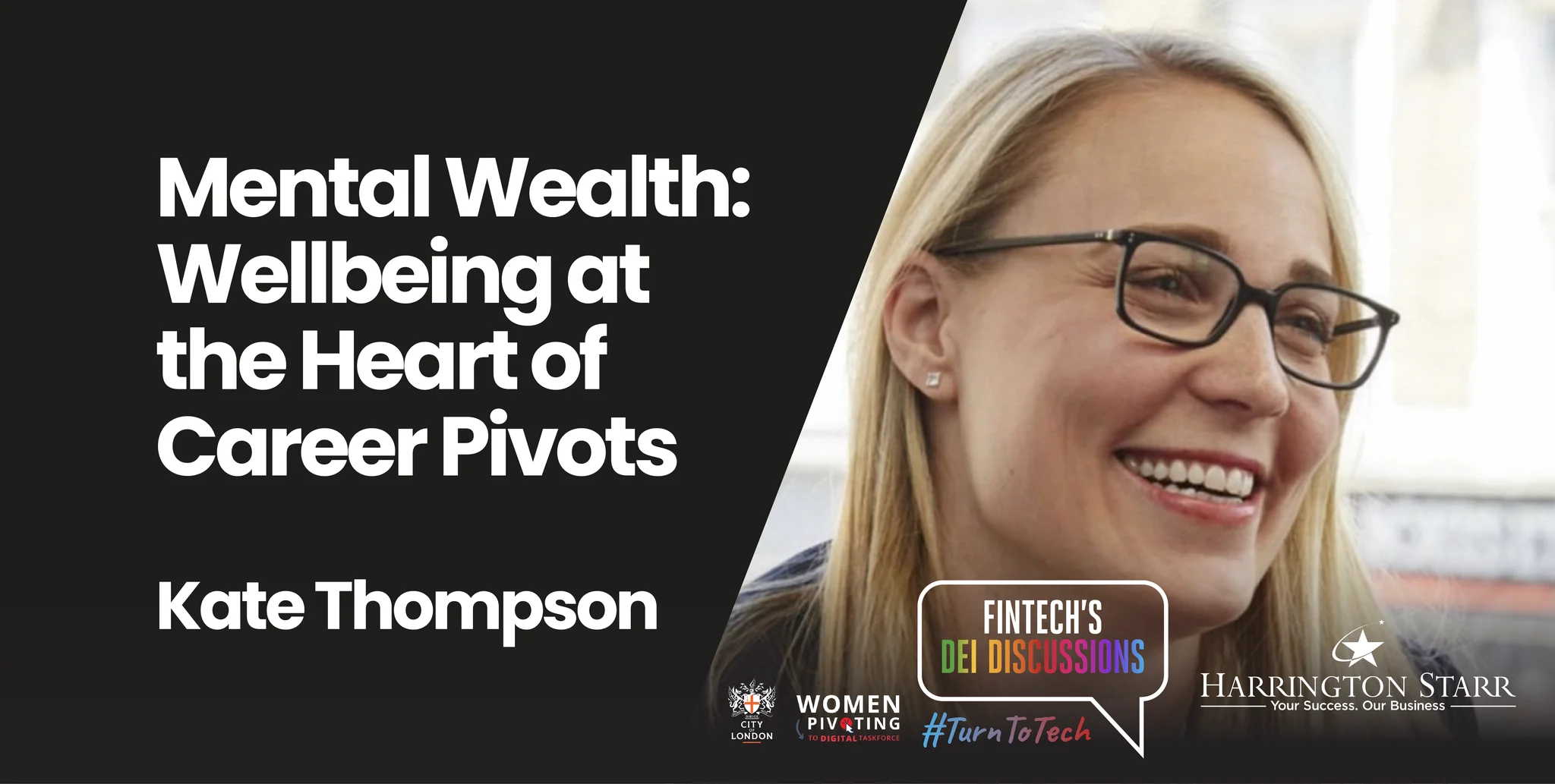
The Cost of Exclusion in FinTech
Live from the MoneyPod podcast booth at Money20/20 Europe 2025 in Amsterdam, the latest episode of FinTech’s DEI Discussions brings together powerful voices to explore a timely and complex question: What do we lose without inclusion?
Hosted by Nadia, this special live edition features three industry leaders: Regina Lau, Chief Financial Officer at Weavr.io; Teresa Cameron, Group Chief Financial Officer at Clear Junction; and Jovi Overo, Chief Executive Officer at Vault. The panel addresses the realities of exclusion in FinTech, why some organisations are stepping away from DEI, and what can be done to create truly inclusive, human-centric workplaces in an industry driven by innovation.
As a FinTech recruitment specialist, Harrington Starr understands the immense impact inclusion has on talent retention, hiring success, and the long-term performance of teams. This episode captures not just expert opinions, but lived experiences and practical takeaways for the future of FinTech work.
Inclusion in FinTech Workplaces: A Business Necessity, Not a Buzzword
The conversation opens with a bold challenge: What does exclusion look like, and why are firms stepping back from their DEI commitments? Nadia notes that some FinTech companies are retreating—not just from public discourse around DEI, but also from funding and resources. This pullback raises questions about how genuine those commitments ever were.
Jovi Overo draws a line in the sand. He argues that if DEI initiatives crumble under political or cultural pressure, then those initiatives were never built into the business in the first place. He compares it to the world of sport, noting that great athletes perform under pressure—and so should companies committed to inclusion. When inclusion is treated as optional, it reflects a lack of substance and long-term thinking.
Teresa Cameron shares how rigid return-to-office mandates are excluding people once welcomed by more flexible working structures. During the pandemic, working from home became a powerful enabler, particularly for working parents, caregivers, and those with accessibility needs. Forcing everyone back into traditional office settings removes critical flexibility and disproportionately affects those already facing barriers to inclusion.
Regina Lau reinforces that exclusion often stems from an unawareness of difference. People engage with work environments in different ways, whether due to personality, cultural background, or neurodiversity. Leaders must account for these differences if they want their organisations to thrive. Inclusion is not just about policy; it’s about daily practices, team dynamics, and creating environments where everyone can meaningfully contribute.
Redefining DEI in a Politicised Landscape
The group discusses whether the term “DEI” has become too politicised or misinterpreted. Jovi suggests that many now view DEI as performative or agenda-driven, which results in immediate resistance. To move the discussion forward, he proposes changing the narrative. For him, many of the principles grouped under DEI, such as fairness, good communication, and equal opportunity, are simply signs of good business practice.
Regina agrees that the language surrounding inclusion can sometimes get in the way of progress. She highlights how simple tools like meeting transcripts, video captions, or setting agendas in advance can support more inclusive conversations, particularly for people working in a second language or with different communication styles. These aren’t grand gestures; they’re thoughtful, everyday actions that create better outcomes for teams and clients alike.
Teresa echoes this point, urging managers to create conditions where people can prepare, participate, and reflect. That means allowing for different paces of thought, different work styles, and recognising that not everyone is comfortable jumping into a live conversation. Some people need a little more time or structure to contribute fully. None of that makes them less valuable, iit simply means they work differently.
Embracing Neurodiversity in the Future FinTech Workforce
Nadia introduces a striking statistic from neurodiversity advocate Cressida Stephenson: 53% of Gen Z and 70% of Gen Alpha identify as neurodivergent. As these generations enter the workforce, their expectations and needs will redefine what inclusive workplaces must look like.
Teresa expands on this by referencing a Birkbeck University study showing that 70% of neurodivergent employees experience mental health challenges in the workplace, and 65% fear discrimination if they disclose their needs. Even more concerning, 46% of managers admit they don’t feel equipped to support neurodivergent team members. This data paints a clear picture: without targeted education and policy change, businesses are setting themselves up to exclude a significant portion of future talent.
Jovi is candid in admitting he was unfamiliar with the term neurodivergence before preparing for this conversation. His honesty reflects a broader truth, many business leaders are simply unaware of what neurodiversity means, let alone how to support it. But as the workforce changes, leaders must change with it. Without that evolution, firms risk alienating large swaths of potential employees.
Regina points out that workplace tools and practices, like transcription, summarised meeting notes, and accessible communication formats, can make a profound difference. But she also reminds us that leadership is not one-size-fits-all. Great leadership means adapting to the needs of each person, not applying a rigid style to everyone.
Representation and Relevance: Why Lived Experience Matters in FinTech
The panel shifts to discussing how lived experience shapes product development, strategy, and innovation. Jovi shares his own background growing up in a single-parent household without access to financial literacy. His mother, like many in underserved communities, was never taught about credit scores, savings, or basic financial services. The mainstream financial system didn’t speak to her needs, and that experience shaped Jovi’s motivation to work in FinTech.
For Jovi, inclusion isn’t just about fairness; it’s about product-market fit. FinTech firms that lack representation from the communities they serve are building in the dark. Whether it's remittance solutions for cross-border markets, embedded finance for marginalised demographics, or crypto banking tools for the unbanked, leaders must understand their users on a lived level.
Regina agrees. She’s worked across multiple geographies and knows how business norms differ around the world. Working with people from diverse backgrounds has helped her understand the nuances of local markets, which in turn has led to better decisions and stronger business results.
Inclusion is not an HR issue; it’s a product and profitability issue. And it should sit firmly on the agenda of every FinTech leadership team.
The Real Cost of Exclusion: Talent Loss and Missed Opportunity
Teresa brings a critical insight to the table: exclusion doesn’t just cause emotional harm, it drives real business consequences. People leave. Projects slow down. Innovation stalls. Recruitment becomes harder. Retention becomes costlier.
She references a study from XpertHR showing that diverse teams are 60% more innovative than homogeneous ones. That kind of data should be impossible to ignore. Yet many leadership teams still unconsciously recruit in their image, creating teams that agree with them instead of challenging them.
At Harrington Starr, we see this play out frequently. Businesses that fail to invest in inclusive recruitment strategies struggle to attract top-tier candidates, especially in highly competitive markets like London and New York. The best FinTech professionals today are evaluating more than just salary. They want meaningful work in environments where they can grow, feel safe, and be seen.
Jovi offers a different angle. He recalls being told early in his career that if no one gave him a seat at the table, he’d need to build his own. It was harsh advice, but it stuck with him. That spirit of resilience has helped him succeed in the start-up world. Still, he’s clear that resilience shouldn’t be a substitute for inclusive practices. The industry can’t afford to push out great people just because they don’t fit a narrow mould.
Human-Centric Leadership in FinTech: Leading with Empathy and Awareness
In a powerful closing segment, the conversation turns to leadership. What does human-centric leadership really look like in today’s FinTech ecosystem?
Regina offers a simple but compelling answer: “People build businesses.” If you’re not looking after your people, your business is at risk. The integration of personal and professional lives means employees are bringing more of their true selves to work. Leaders need to respond with empathy, flexibility, and a willingness to adapt.
Teresa believes leaders have a dual role: to grow the business, yes, but also to foster future leaders. That means mentoring, supporting, and setting an example of what good leadership should look like. In her view, reverse mentoring, where junior staff mentor senior leaders, can be a powerful tool for learning and perspective shift.
Jovi notes that leadership is about earning followership. A leader without followers is just someone taking a walk. True leadership means creating a culture where people feel safe, seen, and supported. Inclusion isn’t just a side project; it must be built into the DNA of the business.
Nadia adds a personal touch, speaking openly about her hearing loss and how long it took to disclose it in professional settings. For years, she worried that sharing her condition would cost her opportunities. That fear is real for many people with disabilities, chronic illnesses, or hidden differences. Building inclusive workplaces means building trust. And trust must be earned through consistency, compassion, and action.
Why Inclusive FinTech Recruitment Matters More Than Ever
As a FinTech recruitment company operating across London, New York, and Belfast, Harrington Starr knows that the success of any business starts with its people. The demand for top FinTech talent has never been greater. But the expectations of that talent are evolving just as quickly.
Inclusion is no longer a “nice-to-have”—it is essential to attracting and retaining the best professionals in the market. Candidates are asking questions about culture, flexibility, psychological safety, leadership style, and opportunities for growth. They’re paying attention to how companies handle differences, and how genuinely they support diversity of thought and background.
From Chief Financial Officers to Product Managers, Software Engineers to Application Support professionals, we help FinTech companies build diverse, high-performing teams that reflect the clients and communities they serve. We understand that inclusive recruitment doesn’t just widen the talent pool, it raises the bar for the entire industry.
This episode of FinTech’s DEI Discussions is a reminder that inclusion, in all its forms, is a business-critical issue. Whether you call it DEI or good leadership, it’s about treating people with fairness, designing flexible systems, and building companies that are future-ready.





